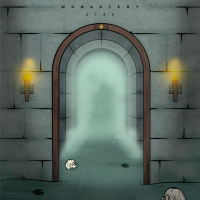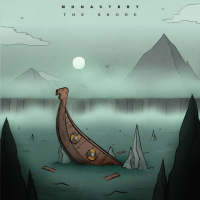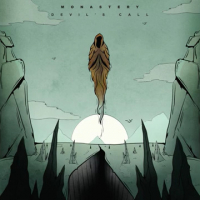"2124" by Monastery
Review
If, very much like me, you've been following the release by instalments of the Monastery EP & not only enjoying the great music but also trying to figure out the narrative via the component pieces, then you'll be pleased by today's sharing of Part Three which is called "2124" and fits together with "Devil's Call" and "The Shore" (the latter of which can also be found on ‘Hot Music Live Presents Volume Ten').
I'm pleased to say that this one threw me: and I'd much rather that than have it confirm any expectations which I might have formed. How dull would that be?
If the title refers to a date then the futuristic nature of it is very hard to reconcile with its predecessors whose setting (in as much as I could figure those out) seemed either deep in the historic past or more likely in the mythical & mystic past…. Could time travel have entered the picture? Are we talking about legendary figures who exist independent of our concept of linear time such as Michael Moorcock wrote repeatedly of or who figure in Joseph Campbell's "The Hero with a Thousand Faces"? Frankly one can certainly read this into the lyrics: the protagonist seems constrained by Time itself (is Time a character in the story?) and is subject to a "slow death": the slowness of which might be defined as much by centuries as any other measure I suppose…
Equally the unity of place is fractured & mysterious: I found "Devil's Call" to summon up the gothic aspects of the American South & the setting of "The Shore" had me thinking of the Northumbrian coastline in Viking times, though the apparent location of this song on an island of some sort isn't necessarily inconsistent with what we've been told before.
The other question I'm asking myself as the pieces become assembled is one I can't remember ever contemplating previously. While hitherto accepting the existence of a fuller narrative which informs the lyrics of the songs across the EP, I'm now wondering about the music too: could Monastery have written the whole EP as effectively a suite or whole piece comprising different movements like a classical composition? The unity of feel & sound is certainly consistent with that…. If so, much respect to them for their vision & capacity to pull it off.
Their trademark "prog-doom-thrash heavy metal" is still the defining style and the Grim Reaper invocation I noted last time is still in evidence. I mentioned before about "..Liv's very stately & measured vocal emphasises the apocalyptic much more frighteningly than had she gone for a banshee effect: you feel that what is coming is grimly inevitable & that no power can hold it back.." Perhaps it's now arrived? At any rate the thrashing aspect remains relentlessly ominous & as unstoppable as the famed Temple Car of Jaganath and as for the doom bit: well that pervades it entirely. If you had to compose music which sought to define the term, this is nigh perfect. The word "epitomises" springs to mind. Guitarist Josh Sellis has a rare knack for conjuring up original and ominous riffs that are so clear that you wonder why you hadn't heard them elsewhere before: thank goodness he moved to that instrument from his original drumming role in the group.
What you don't need underneath this is a skittish & lightweight rhythm section and fortunately Lewis Guest and Kyle Smith provide due gravitas without being ponderous.
As Liv said to me in terms of how the story is building in relation to this chapter "..there's definitely some gaps...." so clearly they are holding back critical plot elements to keep us on our toes: which they appear to be enjoying. It also rather absolves us from finding absolute clarity at this particular stage.
Thankfully, once again the music is sufficiently splendid that we need not succumb to anxiety over the bigger picture & just enjoy "2124" on its own considerable merits. However there is one final thought which I'd like to share with you. Proggy rock is often criticised for over solemnity: to the point of humourlessness in the worst cases. Monastery, by teasing us with the promise of meaning in excess of the sum of the parts, but which they keep tantalisingly out of our reach, evade this & introduce a note of playfulness which this reviewer certainly appreciates. I wonder too, given both this trait and the fact that they've clearly built up a fictional world, whether they are intending some sort of associated game, such as the one Emma McGann created with her "Monsterverse"? On the evidence available, there is nothing to suggest that (yet), but it seems both possible & a good idea to me.









